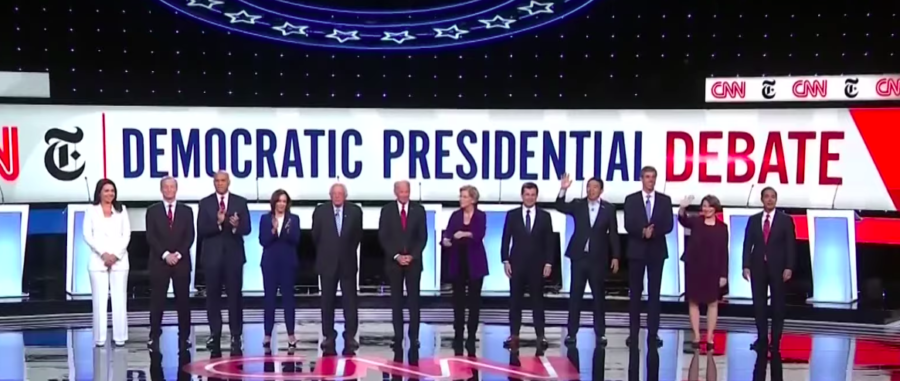Candidates set for next Democratic debate
The most recent Democratic presidential debate on Oct. 15 featured the largest field of candidates onstage in history. Candidates discussed topics varying from health care to gun control.
November 13, 2019
The qualification period has closed for the latest round of Democratic presidential debates.
As the criteria to qualify for the debates have become more difficult to reach, the number of candidates on stage has decreased. The November debate will consist of 10 candidates: Joe Biden, Elizabeth Warren, Bernie Sanders, Pete Buttigieg, Kamala Harris, Andrew Yang, Amy Klobuchar, Cory Booker, Tulsi Gabbard and Tom Steyer.
Julián Castro, who appeared on the October debate stage did not make the cut, and Beto O’Rourke, who also appeared on that stage, has since dropped out of the race.
The debate will be broadcast Wednesday on MSNBC, with the network set to co-host the debate alongside the Washington Post.
To qualify for this debate, a candidate needed to receive two qualifying polls of at least 5 percent in the early voting states of Iowa, New Hampshire, Nevada or South Carolina, or four polls of 3 percent or more nationally in those states as well as 165,000 unique donors over the course of their campaign.
As for the December debates, only six of the 10 candidates in the November debate have qualified for it, with its even higher qualification criteria.
Mack Shelley, Iowa State professor and chair of the political science department, said because of the higher qualifying criteria this debate may be pivotal for candidates that are on the fringes of the stage.
“There are some candidates around the bubble, as far as their campaigns go, so for them it’s really a matter of life or death,” Shelley said. “There are these candidates on the edge with just single-digit support numbers and not a huge number of donors, so for them this is really essential.”
This may impact how the candidates strategize. Shelley said he expects to see attacks on Warren continue due to her rise in the polls.
“It is also really essential for the candidates that are at the top of the heat, some combination of Buttigieg, Biden, Sanders and Warren, they are in the top tier and they are trying to get some daylight,” Shelley said.
Shelley said he also expects to see discussions such as health care, education and the environment as key topics for this debate. Due to recent skirmishes in Syria, Shelley said he thinks questions about foreign policy, refugees and immigration issues will be asked.
At the end of the day these debates impact everyone, including students, and Shelley said he believes this is why students should tune into important moments in national history such as the debates.
“There are certain issues, one of which is health care, that will resonate with students,” Shelley said. “I think general questions about the wealth gap, inequality, unequal access to health care and education are going to be central for students.”







